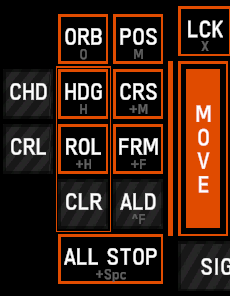Ships
Movement controls
If a formation action menu is opened movement controls will be applied to the guide ship.
| Display | Setting | Effects |
|---|---|---|
| ORB | Orbit Position | Move to a designated area and orbit around it |
| POS | Move To Position | Move to a designated area and hold position |
| CHD | Clear Hold Heading | Cancels a Hold Heading command |
| HDG | Hold Heading | Face the selected direction regardless of heading |
| CRS | Drive Course | Travel in a direction indefinitely |
| CRL | Clear Roll Ship | Cancels a Roll Ship command |
| ROL | Roll Ship | Selects a new direction as the "up" direction of the ship |
| FRM | Form With Ship | Choose a ship to become a guide ship and then designate a position around it |
| CLR | Clear HDG/ROL | Cancels Hold Heading and Roll Ship commands |
| ALD | Assume Lead | Become the new guide ship of the formation |
| ALL STOP | Hold Position | Cancels all movement commands |
Tactics
- ORB / Orbit Position allows most weapons to have a good angle on the target. However it also exposes the same armor side continuously, which can be whittled down with enough fire.
- HDG / Hold Heading can be used to avoid exposing the main engines, drive module and reactor to enemy fire but the ships will have less acceleration.
- ROL / Roll Ship can be used to keep certain weapons or radar panels angled at an enemy ship. Ships can roll faster than enemy ships of the same size can position around them.
- ALD / Assume Lead is useful if the guide ship becomes disabled but the rest of the fleet need to carry on with their objective.
Posture controls
Posture controls determine how a ship will operate and maneuver and which sensor and defensive systems are enabled.
| Display | Full name | Settings |
|---|---|---|
| THRTL | Throttle Control |
|
| MNVR | Maneuvering Posture |
|
| FORM | Formation Positioning |
|
| BSHRT | Battle-Short |
|
| RADAR | Radar Emissions Control |
|
| COMM | Communications Emissions Control |
|
| ESUPT | Electronic Support Modules |
|
| WCON | Weapons Control |
|
| PDTRT | Point Defenses - Turrets |
|
| PDSML | Point Defenses - Missiles |
|
| DECOY | Point Defenses - Decoys |
|
| PDZNE | Point Defense Zone |
|
Missiles
Missiles are the most powerful weapons but they have limited ammunition, can be shot down and fire slower than other weapons. The number of missiles that can be prepared to fire at the same time depends on the ship's maximum salvo size. There are three types of missile guidance:
- Command guided missiles are guided by the launching ship. They fly in a straight line and if they miss the target they will turn around and try again until they runs out of fuel, are shot down, or finally hit the target. They are very difficult to avoid but can be rendered harmless by destroying the launching ship or jamming its sensors or communications. Command guided missiles must be shot at a sensor track.
- Active radar guided missiles guide themselves. They can be ordered to fly along indirect paths. When they reach the end of their path they will seek a target in a cone in front of them. If fired at long range they can be avoided with evasive maneuvers. They are also vulnerable to jamming or sufficiently advanced decoys.
- Semi-active guided missiles guide themselves but require an illuminator to home in on a target. The illuminating signal can be provided by any ship with an illuminator but can be blocked by asteroids. They are less vulnerable to jamming and decoys.
Ship hulls
Ship hulls determine a ship's base stats as well as how many components it can have. Larger ships can carry more components but they are slower and easier to detect.
Shelter Alliance hulls
Shelter Alliance ships scale linearly. The larger the ship the higher its stats, both positive and negative.
| Name | Mass (tonnes) | Armor Thickness (cm) | Component DR (%) | Base Crew Complement | Crew Vulnerability (%) | Structural Integrity | Radar Signature (m2) | Modifiers | Point Cost |
|---|---|---|---|---|---|---|---|---|---|
| Sprinter Corvette Class | 3000 | 8 | 0 | 40 | 60 | 1000 | 2890 | -20% Flak Damage Probability | 100 |
| Raines Frigate Class | 5000 | 15 | 5 | 50 | 60 | 3000 | 3783 | -15% Flak Damage Probability +1 Missile Programming Channels |
125 |
| Keystone Destroyer Class | 8000 | 22 | 10 | 50 | 45 | 4000 | 6281 | +1 Missile Programming Channels -75% Overheat Damage Chance (Beam) +25% Powerplant Efficiency |
200 |
| Lauxhall Light Cruiser Class | 10000 | 30 | 20 | 75 | 25 | 5500 | 11727 | +2 Missile Programming Channels | 350 |
| Axford Heavy Cruiser Class | 13000 | 40 | 40 | 90 | 25 | 6500 | 14332 | +2 Missile Programming Channels | 600 |
| Solomon Battleship Class | 21000 | 52 | 40 | 150 | 30 | 8000 | 27876 | 1000 |
Outlying Systems Protectorate hulls
Outlying Systems Protectorate are more specialized, with each ship hull being made for different roles.
| Name | Mass (tonnes) | Armor Thickness (cm) | Component DR (%) | Base Crew Complement | Crew Vulnerability (%) | Structural Integrity | Radar Signature (m2) | Modifiers | Point Cost |
|---|---|---|---|---|---|---|---|---|---|
| Shuttle Clipper Class | 1500 | 5 | 0 | 55 | 60 | 1000 | 2890 | -20% Flak Damage Probability | 50 |
| Tugboat Clipper Class | 3500 | 5 | 0 | 40 | 60 | 1000 | 4685 | -20% Recycle Time | 75 |
| Cargo Feeder Monitor Class | 5000 | 40 | 20 | 40 | 60 | 1000 | 9869 | 175 | |
| Ocello Command Cruiser Class | 12000 | 30 | 40 | 80 | 25 | 6500 | 15745 | +2 Missile Programming Channels | 575 |
| Bulk Freighter Line Ship Class | 15000 | 20 | 35 | 100 | 75 | 3000 | 15745 | +20% Team Move Speed | 350 |
| Container Liner Line Ship Class | 15000 | 20 | 20 | 100 | 75 | 3000 | 15745 | +2 Missile Programming Channels | 1000 |
 Hooded Horse Wikis
Hooded Horse Wikis

